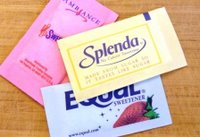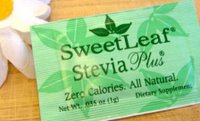 Generally, I am not in favor of things that are labeled "artificial". And artificial sweeteners are a good example. Whether they're in diet soda, coffee, cereal, whatever, the growing body of evidence against the pink, blue, and yellow alternatives, is clear: Unless you want to be an unknowing lab rat in the long term public study of the effects of sweeteners, avoid them.
Generally, I am not in favor of things that are labeled "artificial". And artificial sweeteners are a good example. Whether they're in diet soda, coffee, cereal, whatever, the growing body of evidence against the pink, blue, and yellow alternatives, is clear: Unless you want to be an unknowing lab rat in the long term public study of the effects of sweeteners, avoid them.The good news if you like it sweet, there is an alternative that seems to be both sweet, AND healthy, and I use it every day.
Splenda® looks like it might be a real danger with the wave of products it will appear in, largely in response to the low-sugar concerns of dieters. It is being touted as the great savior of the sweet tooth.
Responsible experts are on one side of the argument saying that Splenda is unsafe — the latest sweetener that starts off claiming to be a healthy choice, only later to be proven to be full of side effects. How about this: Some authorities are saying that Splenda has more in common with DDT than with food. DDT. That's poison I think.
So be careful, and be informed.
Splenda -- Products sweetened with Splenda can be labeled “natural” because of the FDA-approved claim that Splenda is made from sugar. Splenda is made from a synthetic compound called sucralose, two molecules of sucrose (sugar) and three molecules of chlorine. YES... SPLENDA IS 2/3 CHLORINE. Sounds like I'd be better off pouring a packet into my jacuzzi than I would pouring it over Ava's cereal.
Apparently those chlorine molecules get stored in your fat cells and it may take years to figure out whether they’re influencing your health. I am willing to guess it's not good. The manufacturer's own short-term studies showed that sucralose, the chemical name for Splenda, caused shrunken thymus glands and enlarged livers and kidneys in rodents. But those were rodents, and we love them. As for humans, well, in this case, the FDA decided that because these studies weren’t based on human testing, they were not conclusive. There are no long-term studies. So WE are the long term study (although it is likely Splenda SHOULD be banded from rodent use. Sorry, Mickey.)
Some evidence shows side effects from Splenda, including skin rashes/flushing, panic-like agitation, dizziness and numbness, diarrhea, muscle aches, headaches, intestinal cramping, bladder issues, and stomach pain. These show up at one end of the spectrum — the people who have an allergy or sensitivity to the sucralose molecule. But like I said, the affects of the chlorine build up are unknown. That's my real point here.
By the way, almost all the independent research into aspartame (Equal) found dangerous side effects in rodents. The FDA did not to take these findings into account when it approved aspartame for public use. And within 15 years those side effects appeared in humans who were vulnerable to the chemical structure of aspartame. Tough break.
It's important to note that as food additives, artificial sweeteners aren't subject to the same FDA scrutiny and trials as pharmaceuticals. Most of the testing is funded by the food industry, which has a vested interest in the outcome. So the fox is guarding the hen house. Bet them are some sweet hens!
Some of the chemical ingredients in artificial sweeteners are well known hazards. Side effects depend on your biochemistry. Manufacturers are "hoping" that the body won’t absorb much of these compounds at any one time. But with the Splenda explosion that's happening, you won't know the effect on you until you’re already sick. Some scientists are calling Splenda a mild mutagen based on how much you absorb. Hey, maybe you could get a cool mutant power and be the next member of the X-Men! A mutagen! Unreal. We won't know the health implications for decades. But mutants are fun to watch. So stay tuned.
For people trying to be healthy, artificial sweeteners can seem like the best of both worlds — sweetness without calories. But the risks as I've outlined can be just as great, or worse. Time will tell.
Aspartame, the main ingredient in Equal and NutraSweet should be avoided by most people, but particularly in those with neuropsychiatric concerns. Recent studies in Europe show that aspartame use can result in an accumulation of formaldehyde in the brain, which can damage your central nervous system and immune system and cause genetic trauma. I had a twitch in my neck this weekend and thought, "Did all those years of Equal in my coffee add up to this?" I hope it goes away soon.
Aspartame has also been linked with MS, lupus, fibromyalgia and other central nervous disorders. Possible side effects of aspartame are: headaches, migraines, panic attacks, dizziness, irritability, nausea, intestinal discomfort, skin rash, and nervousness. Some people have woken up and been a completely different race after ingesting a packet of aspartame. Oh. Wait. That was the movie "Watermelon man". Anyway, some researchers have linked aspartame with depression and manic episodes. It may also contribute to male infertility. That alone would make me sad.
Saccharin, was the first widely available chemical - I mean artificial - sweetener. Most researchers agree that in sufficient doses, saccharin is carcinogenic in humans. The question is, how do you know what your "sufficient dose" is? (Figure it out, and consume just a little bit less, and you'll be a-ok.)
Some practitioners think saccharin in moderation is the best choice if you must use an artificial sweetener. It has been around the longest and seems to cause less problems than aspartame. Party on.
Bottom line, these artificial sweeteners are body toxins. They are never a good idea for pregnant women, children or teenagers (unless the teenager is being really difficult, then it's probably justified) despite the reduced sugar content — because of possible irreversible cell damage. Like smoking... if you decide it’s worth the risks, then go ahead, but would you put a cigarette in your kids hands so they would consumer less sugar?
 So here's the good news... sugar substitutes don’t have to be artificial. There is an alternative, and it's "Stevia". They are the natural alternatives to artificial sweeteners. For many years, diabetics have used products sweetened with polyalcohol sugars like xylitol, malitol, and mannitol. These are natural sweeteners that do not trigger an insulin reaction. (Xylitol comes from birch tree pulp.) They have half the calories of sugar and are not digested by the small intestine.
So here's the good news... sugar substitutes don’t have to be artificial. There is an alternative, and it's "Stevia". They are the natural alternatives to artificial sweeteners. For many years, diabetics have used products sweetened with polyalcohol sugars like xylitol, malitol, and mannitol. These are natural sweeteners that do not trigger an insulin reaction. (Xylitol comes from birch tree pulp.) They have half the calories of sugar and are not digested by the small intestine.I personally recommend the herb Stevia as a natural sweetener. I use it. And good old Trident gum now uses Xylitol in some packages marked as such. Stevia has been used for over four hundred years without ill effect. Stevia has been enormously popular in Japan, now rivaling Equal and Sweet’N Low. It’s 20 times sweeter than sugar, so a small portion of Stevia will sweeten even a strong cup of tea. In fact, when I first started using Stevia, I used too much and thought is was awful. Then I tried again, used less (in coffee by the way) and now drink my coffee feeling a little less guilty.
Stevia is slowly gaining steam as a sugar substitute, despite hurdles. The FDA has approved its use as a food supplement, but not as a food additive due to a lack of studies. Stevia can be used for anything you might use sugar in, including baking. It is naturally low in carbohydrates. You can buy Stevia at most health food stores and over the web. There may be those who have a sensitivity to a substance, but based on reports in other countries it appears to have little to no side effects.
So there it is... that's my opinion. Stay as far away from the chemicals as you can, and if you like it sweet, use some of nature's sugar alternatives like Stevia and Xylitol.
Please note: This information was accumulated from a number of resources, most notably an article titled "Sugar substitutes and the potential danger of Splenda", By Marcelle Pick at http://www.womentowomen.com/nutritionandweightloss/splenda.asp, http://www.mercola.com/2000/dec/3/sucralose_dangers.htm, "The Secret Dangers of Splenda (Sucralose), an Artificial Sweetener" by Dr. Joseph Mercola at http://www.mercola.com/2000/dec/3/sucralose_dangers.htm, and Splenda Toxicity Reaction Samples (Updated 2/13/2006) http://www.holisticmed.com/splenda/ which drew this conclusion from its research: "While it is unlikely that sucralose is as toxic as the poisoning people are experiencing from Monsanto's aspartame, it is clear from the hazards seen in pre-approval research and from its chemical structure that years or decades of use may contribute to serious chronic immunological or neurological disorders."






7 comments:
Well Hallelujah! I've been saying that for years to some family members who insist that Splenda is OK, because it's just sugar! Great to see someone's in agreement! Will have to remember to mention the chlorine next time though. I have used Stevia on occasion, but generally am trying to avoid it as well these days.
Thanks once again, Carl!
LoriJ
Ontario, Canada
I agree with everyone else!! I'd rather have plain ol' turbinado sugar than all that "fake" stuff. I bought a box of cereal for my kids just this week and didn't even see the "Sweetened with Splenda" on the box!! When I looked closer, it said, "75% less sugar!"
Duh, it should have said, "25% sugar, 75% chlorine!!"
Thanks for making me throw out my husband's Splenda stash. Will buy more Stevia in the future! Anyone want to carpool to Whole Foods?
Sarah
You're right about the amount of stevia. You need very little. The first time I tried it, it was so bitter! It's been on the shelf ever since. Today, I put it in my 1/2 gallon green tea mixture (1/2 gal water, 3 green tea bags and 1 tsp. stevia). Perfect! Not bitter at all. Thanks, Carl, for the nudge.
Lisa (Dixie belle on the boards)
I was reading the article on artificial sweetners and I just have one question. What about the Chlorine you normally get from plain old table salt? Salt is nacl or sodium and chlorine together to make sodium chloride. And what about tap water? Some communities chlorinate their water to make it safe for drinking. Some bottle waters even add chlorine to improve its tastes. So what's so different if Splenda has chlorine in it.
You are absolutely right -- there is no difference between chlorine in table salt (which could be called "artificial salt"). Both chlorine in table salt and chlorine in tap water are harmful to your health so I would suggest bottled water from a pure source and Himalayan salt.
I could go deep here, but then I'd never have another blog post to make.
Sweetleaf is purified from the sweetest part of the Stevia plant leaves using purified water. It has NO modifications from what Nature created herself. Just pure, natural sweetness. Nothing man-made about it. Sweetleaf.com
I use SweetLeaf brand of stevia and love that it has 0 calories, 0 carbs, 0 glycemic index and 0 chemicals!
Post a Comment